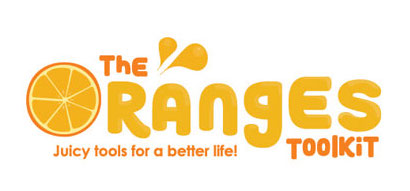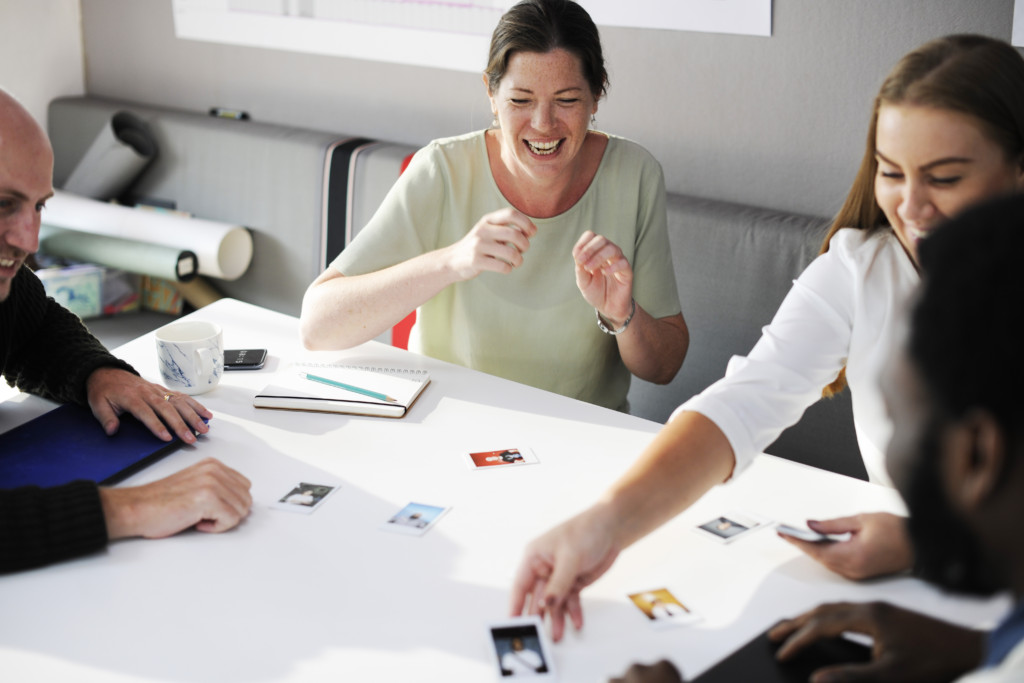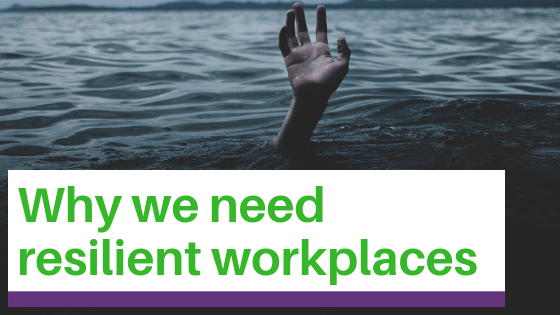What does resilience mean to you and why do we need it in Australian workplaces? I want you to put yourself in a scenario before we get started.
Our scenario starts on Sunday evening. Sitting back to relax with Netflix, you find yourself unable properly to follow the story. You can feel Monday stealing your happiness away, because you have to go to work. The Australian comedian Steve Hughes commented that Sunday isn’t really Sunday because Monday steals your last day off away from you. You might have two days off, but it’s not two full days.
“It’s not even two full days off, is it. Because Sunday’s right next to Monday, and Monday’s going, ‘Can you feel me? Eh? You can feel me, can’tcha, because you didn’t get up until ten to four this afternoon!’ It’s gotta be stopped.” – Steve Hughes
This is work related stress. And it’s really common in Australian workplaces.
What stress costs us
Eight years ago, the Australian Human Rights Commission wrote that stress-related workers’ compensation claims cost us over $10 billion each year. Furthermore:
Preliminary research shows that Australian businesses lose over $6.5 billion each year by failing to provide early intervention/treatment for employees with mental health conditions.
The South Australian Mental Health Commission in 2018 stated that there are 19,000 weeks lost every year in that state due to mental-health related claims. One in five South Australians took time off work in the past 12 months because they felt mentally unwell.
Only 52% of Australian workers believe that their workplace is mentally healthy.
It’s obvious that we need resilience, and resilient workers. We know the problems when we don’t have resilient employees.
But why, if we know this, are we doing it so badly?
Resilient workplaces need the right approach and the right tools.
Under Australian Workplace Health and Safety laws, we know that we are required to manage risks to psychological health and safety. We have to be diligent in assessing risk, and we need to eliminate or minimise them.
Much of the time, this perspective results in a reactive approach. In our organisations we have Employee Assistance Programs, fair disciplinary and performance management measures. We have grievance processes and complaints management. We do staff surveys, pulses, and check-ins.
All of these things help. But in the majority of cases, our workplaces are structured to react to problems, instead of to prevent them.

Photo by Nikita Vantorin on Unsplash
Prevention is more than skin deep
There are some fantastic things that you can do to improve workplace mental health and wellbeing. Some of them are covered in this article at the ABC.
And yet, while there are loads of singular things you can try, many recommendations miss the critical part: Knitting them together into an outlook.
If you can improve your physical activity, change your lifestyle, and build great support networks, that’s great. But it’s not sustainable unless you have a complete toolkit at your disposal, and know when to use it.
We know that we need more resilient workers in Australia. And we know that we need tools to help us. So why are we so bad at putting the tools into practice?
The fine line between business outcomes and personal development
One of the reasons might be because while the business outcomes are amazing, the road to resilient wellbeing is a personal one.
Personal development isn’t exactly a business outcome, is it? Teaching your employees to live well isn’t necessarily going to make your board happy.
But what if the way forward brings the two together? Well you can.
Introducing The ORANGES Toolkit

The ORANGES Toolkit was developed by Camp Quality. It is a program that takes you through all of the tools that you can use to improve your mental wellbeing, and it helps you find the best ones to put to use in your life.
Crucially, ORANGES is a complete program for cultural change in workplaces. It isn’t about just training your teams and letting them work it out. When implemented systemically, ORANGES has simply incredible outcomes.
ORANGES creates incredible outcomes
ADSSI HomeLiving Australia, on the NSW Central Coast, is a large community care care business. Colin Henson, one of the leadership team at ADSSI, explains why resilience was important to them.
‘It’s a people industry, and you need a lot of energy and strength and resilience to turn up at a client’s home day after day after day, and be the person that client needs you to be. That person is positive, and future-focused, and solution focused. The reason we exist is because our clients have a need and their lives can be really tough. And in community care, the clients move on. They move into facilities, or they die … Sometimes when we see those people deteriorate, that’s awfully hard.’
The ORANGES program fell into ADSSI HomeLiving Australia’s lap. When it did, the team introduced it gently, by sending those people whom they knew would be champions. But after a time, the pessimistic people left because the culture changed.
And now?
‘Now 99% of our staff believe in the mission and the values,’ Colin announced proudly. ‘Now that is extraordinary.’
Colin went on to explain that their EAP access rates dropped to the point where their provider called to ask whether they had brought in another supplier.
‘I said no we’re not, but what we’re doing is we’re getting more proactive. We’re getting ahead of people who are getting stressed or ill.’
Business needs metrics, but resilience really is about people
Tegan Davies, one of the team members at The Oranges Toolkit, suggests that the metrics are absolutely necessary. Business must be able to measure the outcomes, which is why ORANGES has robust metrics built into it. But she talked about the impact of ORANGES in terms of her own personal journey.
She explained the difference as the way she explained it to her dad.
‘He hasn’t quite realised that my transformation [as a result of ORANGES] is in everything I do, every single day. I have to turn it into language that he understands. For my dad it’s mining,’ Tegan said.
Tegan went on to talk about how she explained mental wellbeing in terms of asset management: That if you don’t service the machinery in the mine, then it breaks down and you have lost production time and higher expenses. This is why proactive servicing, to prevent breakdowns, is so critical.
‘In fact the most important piece of machinery in your life isn’t this thing that you work on in the mine. It’s your mind and your body,’ Tegan said, recalling how she explained her work to her dad. ‘You can either wait for them to fall apart – which is going to cost you more downtime, more money in doctors, and you’ll be sicker and offline for longer. Or you can proactively manage your mind and body.’
‘For me,’ she went on, ‘that’s what ORANGES is all about’.
How do I know that my workplace has poor resilience?
The three obvious metrics are high rates of sick leave, high Employee Assistance Program access rates, and high turnover.
But the other, unseen metrics, include basics of stress. Stress is insidious, because we tend to accept stress as the ‘normal state’. This article by the Chief Happiness Officer shows you how you might be just accepting the stress mythology without question.
The truth is, stress is about how you feel about your work.
But it isn’t just the work impacting our resilience. It’s also the rate of change at work.
‘The change that happens now is so constant that we have to constantly adapt, and that actually takes time. We are habitual creatures. We like things to be slow, because we want to save energy. It ties into stress,’ Tegan explained.
‘I think that the ORANGES program is about life skills,’ she went on. ‘It’s not just about teaching people the skills they need to be less stressed and more resilient at work. But it’s also about doing this in their personal lives. You cannot not bring your personal life into your work life. There isn’t a separation like people say that there is.’

Should I do the ORANGES program to improve my workplace’s resilience?
Perhaps a better question is, do you want to train people to cope with a terrible workplace? If so, then ORANGES is not for you. You might find that you don’t want to work there any more.
‘If an organisation wants people to do some training so that they’ll tolerate the intolerable, don’t go here,’ Colin at ADSSI Home Living stated bluntly. ‘You will actually empower your people to stand up and say, no this isn’t tolerable.’
The best reason to do ORANGES is to create a workplace with a common language, a workplace that is built on strengths. You should do ORANGES if you want your employees to have a higher baseline, so that the regular cycle of stresses lose their impact.
‘I know stress is difficult to measure, but I think any business needs this,’ said Tegan. ‘This program has changed my relationship to stress. When I feel stress in my body, I don’t get carried away like I used to. I can’t think of single person in our fast-paced Western culture who wouldn’t benefit from managing their stresses better’.
You can get a taste of ORANGES in the first ever public program, 22-23 October 2018
If you want to see what ORANGES is all about, but you don’t want to take a whole team away from work for an unknown, you can now access the public program. You will go through the full program over two days. Then you will see for yourself just how powerful ORANGES can be.
Tickets are limited. Sign up now so you don’t miss out.




Leave A Comment